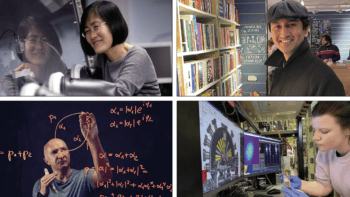Many physics graduates look for jobs in the towns or cities they already live in, rather than moving elsewhere. Andrew Hirst and Veronica Benson explore the implications of this “emotional geography” and discuss how universities can give physicists the skills local employers need

It’s usual to think of physicists as globe-trotting rebels who uproot their lives to go wherever the opportunities lie. Moving from city to city and country to country, they coolly switch locations, following their physics dreams – be it CERN in Geneva, oil rigs in the North Sea or start-ups in Silicon Valley.
The reality, though, is rather different. Many young people – physics graduates included – prefer to stay where they grew up or studied. They have an emotional attachment to the town, city or region they’re already living in, and are reluctant or unable to move. While it’s not exactly clear why, we attribute this to a sense of geographic belonging, which is related to place, family, social and community relations. In some cases, money is probably a key factor too.
The importance that students give to this “emotional geography” also affects the kinds of jobs they can get after graduation. In the UK particularly, the graduate labour market is geographically unbalanced, with most graduate jobs concentrated in London and south-east England and in the larger cities of Birmingham, Manchester and Leeds. So if you’re a physics graduate from a part of the country with few physics-based employers, it’ll be harder to find a job using your physics degree if you can’t – or don’t want to – move.
According to the 2015/16 Destinations of Leavers from Higher Education (DLHE) report, some 69% of UK graduates took their first job in the region of their home domicile. Further analysis using data from the survey shows that 45% of graduates did not move regions at all – they both studied and sought work in their home domiciled region. This inability or unwillingness of graduates to move means that university physics departments need to do more to recognize the importance of “place-based” decision-making when it comes to graduate career choices. Departments also need to adapt their physics degrees so that students can more easily find graduate jobs in the local area – and have the skills that local employers need.
Local skills for local people
The impact of emotional geography on physics graduate outcomes was a key theme of a meeting in London hosted by the Institute of Physics (IOP) in July. The meeting was organized by the South East Physics Network (SEPnet), which links nine physics departments in south-east England, and by the White Rose Industrial Physics Academy (WRIPA) – a collaboration between the universities of York, Sheffield, Hull, Nottingham and Leeds. Emotional geography, it turns out, is a particular headache for physics departments in regions with a low Gross Value Added (GVA) – one way of measuring economic output that can be used as an indicator of regional productivity.
This problem is borne out in an analysis carried out by Alastair Buckley, a physicist at the University of Sheffield, who examined the mobility of students who studied physics at the university between 2011 and 2017. He found that a high proportion (about 50%) of Sheffield physics students’ domiciled (permanent) address when they applied for the course was within 100 km of the university. What’s more, after graduation 65% of Sheffield physics students chose to return to their domiciled address (most likely the parental home) to work. Buckley and colleagues consider these physicists to be “work immobile”, meaning that remaining in a desired location may be more important to them than the type of job they do.
Buckley’s analysis shows, however, that physics graduates at Sheffield who are “work mobile” – i.e. prepared to move after graduation – are more likely to get better, graduate-level work. That’s because other parts of the country with higher productivity and growth have a greater number of graduate-level jobs that make the most of a physicist’s specific skills and knowledge. Indeed, when the five WRIPA departments analysed the DLHE data, they found that physics graduates who stay in the Yorkshire, Humberside and East Midlands region (where those departments are based) have significantly lower prospects than those choosing to leave. Only 55% of them attain graduate-level jobs, compared with the 80% of those who move.
82% of all students live in their original home region a year after graduating – and 65% are still based there a decade later
This insight corroborates a recent analysis by the UK Department of Education, based on the government’s controversial Longitudinal Education Outcomes (LEO) project, which provides information on how much UK graduates of different courses at different universities earn after graduating, by linking up data on tax, benefits and student loans. The LEO data suggest that 82% of all students live in their original home region a year after graduating – and that 65% are still based there a decade later.
Next steps
So what can be done to improve the situation – either by helping students become more mobile, or by improving the prospects of those who cannot or don’t want to move? The WRIPA has recently been awarded funding from the Office for Students’ Challenge Competition to boost links between physics departments and regional employers, to develop inclusive modes of work-based learning and to support physics students to be more work mobile. However, several strategies are already being tried at universities around the UK (see box).
Case study: Amy Hearst
 One physicist who has benefited from her university’s links with local firms is Amy Hearst. She graduated from the University of Southampton, UK, and is now a production engineer at vivaMos, which designs and builds CMOS image sensors for flat-panel X-ray detectors at its premises in Southampton Science Park.
One physicist who has benefited from her university’s links with local firms is Amy Hearst. She graduated from the University of Southampton, UK, and is now a production engineer at vivaMos, which designs and builds CMOS image sensors for flat-panel X-ray detectors at its premises in Southampton Science Park.
However, Hearst might not have realized the opportunities on offer in Southampton were it not for a summer industrial placement she did at the defence and aerospace firm Leonardo, which has a centre of excellence for infrared detectors in the city. During her placement, she made ultrasensitive thermal-imaging cameras used on the TV shows Springwatch and Planet Earth.
Before the placement, Hearst had seen Leonardo as uninteresting. “To me it was just a grey building, it was defence,” she told delegates at a meeting in July about the impact of emotional geography on physics graduates in the UK.
After working at Leonardo as a summer student, Hearst was taken on full-time after graduating. She and her fellow graduate recruits formed a close social and professional network, which led to her wanting to stay in the Southampton area, and she found her current job at vivaMOS thanks to this network.
Hearst’s experience underlines the value of university physics departments developing links with local employers and also of helping physics students to sharpen their professional skills while studying.
One example is the University of Lancaster’s regional “employer engagement strategy”, which physicist Manus Hayne and colleagues developed to support students who want to stay in the area after graduating. Their strategy includes curriculum-based projects for final-year physics students, who work with local industrial firms on real-world problems. These projects are an effective way of connecting students with employers that are less likely to participate in traditional recruitment events. Together with guest lectures, industrial placements and opportunities for internships at local firms, such projects help to create what you might call a departmental “employability ecosystem”.
How can local hi-tech firms shape the nature of physics degrees offered by local universities to ensure that graduates have the appropriate skills?
But how can local hi-tech firms shape the nature of physics degrees offered by local universities, to ensure that graduates have the appropriate skills? One solution adopted by the University of Portsmouth’s School of Mathematics and Physics has been to set up an industry advisory board, which currently has about 20 representatives from local businesses. Complaints from one major local employer that it could not find graduates with the right skills in radar-systems engineering led to the university reintroducing this subject into its undergraduate physics degree.
Portsmouth also delivers a course on the applications and “impact” of physics in partnership with industry and healthcare professionals, developed in response to local skills needs. Indeed, the IOP’s revised degree-accreditation scheme gives physics departments the flexibility to respond to regional economic needs and focus on developing students’ skills. Physics departments are encouraged by the IOP to deliver degree programmes that maintain academic rigour while also embedding key skills such as innovation, leadership, creativity, entrepreneurship and self-management.
Working together
Another attempt to make physicists more employable to local firms has been developed by Trevor Farren, a director of business and knowledge exchange at the University of Nottingham. He delivers an optional interdisciplinary module entitled “Enterprise for scientists”, in which final-year physics students can elect to work with students from other disciplines to develop their innovation, business and entrepreneurial skills. The course involves groups of students pitching ideas to a “Dragon’s Den” panel of local businesses, thereby helping them to develop an understanding of finance, negotiation, sales and marketing as well as enhance their problem-solving and creative-thinking skills.
With jobs evolving all the time, programmes such as these help students to develop the transferable skills needed to adapt to the changing employment environment. They also help students build contacts with potential local employers, in the process raising the value and success of physics degrees offered by local universities. And with graduate recruiters saying that their ideal candidates should not only have a strong academic knowledge of particular field, but also an ability to work outside their core area, it’s more important than ever to ensure that physicists develop the skills that will make them succeed in the marketplace.



